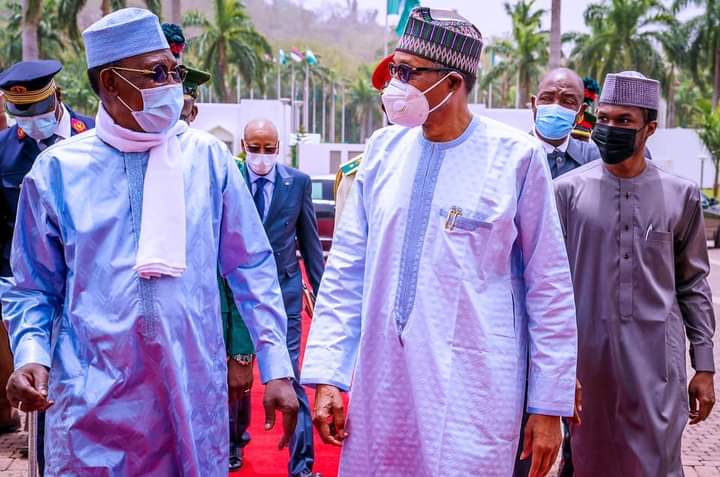President Muhammadu Buhari says the death of Chadian leader Idriss Déby will create a vacuum in the efforts to eliminate terrorism. Expressing sadness over his sudden and tragic death on the frontline fighting against rebel soldiers, Buhari said: “The late Deby had played a very active role in our regional joint collaboration in the military campaign against the Boko Haram terrorists.”
He noted that the death of the Chadian leader would “create a big vacuum in the efforts to jointly confront the Boko Haram terrorists and the Islamic State West Africa Province.” He said: “I’m deeply shocked and devastated by the sudden death of Idriss Déby on the battlefront to defend the sovereignty of his country.”
Buhari described the late leader “as a friend of Nigeria who had enthusiastically lent his hand in our efforts to defeat the murderous Boko Haram terrorists that have posed grave security challenges not only for Nigeria, but also our African neighbours, particularly Chad, Cameroon and Niger Republic.”
While condoling with the people of Chad and their new leader, Buhari, in a statement issued by Senior Special Assistant on Media and Publicity, Garba Shehu, called for greater collaboration to defeat the terrorists.
The slain Chadian leader had visited Nigeria on March 27, days before his country’s presidential election. During the one-day visit, he was received by Buhari at the State House in Abuja, where both leaders discussed bilateral issues, including the security challenges of the insurgency around their nations’ borders and the threat posed to about 30 million people by the shrunken Lake Chad.
Déby died on Tuesday as a result of injuries he sustained during clashes with rebels in the north of the country. Déby “breathed his last defending the sovereign nation on the battlefield”, an army general said on state television of Tuesday. He had gone to the front line, several hundred kilometres north of the capital N’Djamena, at the weekend to visit troops battling rebels belonging to a group calling itself Fact (the Front for Change and Concord in Chad).
He had battled for control of the country against rebels who have been advancing on N’Djamena. The Chadian military had on Monday said troops killed over 300 members of the FACT rebel group. The movement of rebels towards N’Djamena led the United Kingdom to advise its citizens to leave the country. The United States government also asked all non-essential diplomats to leave.
The announcement by the country’s army came a day after provisional results of the April 11 presidential election projected Déby would win a sixth term in office. The government and parliament have immediately been dissolved, a curfew has also been imposed and the borders have been shut.
Déby, 68, spent more than three decades in power and was one of Africa’s longest-serving leaders. An army officer by training, he came to power in 1990 through an armed uprising.
A military council led by Déby’s son, 37-year-old four star general, Mahamat Idriss Déby Itmo will govern the country for the next 18 months. He now becomes Africa’s youngest head of state. He will lead the council but “free and democratic” elections will be held once the transition period is over, the army said in its statement.
Prof Eghosa Osaghae, former Vice Chancellor of Igbinedion University who was recently appointed Director-General of Nigerian Institute of International Affairs (NIIA), said Deby’s death will open a new chapter in Chad-implicated terrorism across the Sahel, the Lake Chad Basin and Central Africa.
“With the death of the president, troops might be withdrawn from border line down to the capital to ensure tight security reducing the guards on duty in border. There may be large influx of rebels/insurgents from Chad to Nigeria or large influx of rebels/insurgents from Nigeria to Chad as a result of the relaxed border. It is really a complex situation. His death calls for maximum alertness,” he said.



